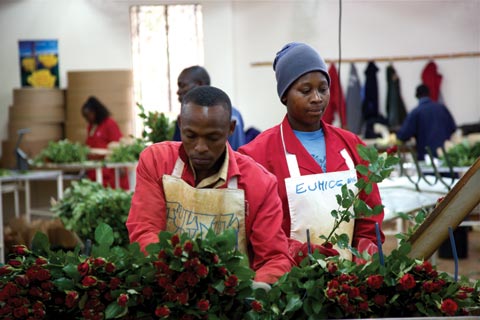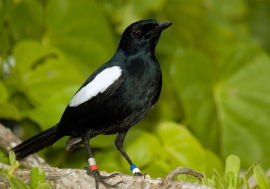In a turbulent world, diversity vital for African economies
In a turbulent world, diversity vital for African economies
 Kenya is building on its successes in horticulture and hopes to become an East African regional trade hub.
Kenya is building on its successes in horticulture and hopes to become an East African regional trade hub.Africa's economy has grown rapidly and steadily since 2000, and has shown remarkable resilience in the face of the global financial and economic crisis. But the continent's dependency on the export of natural resources and primary commodities was bluntly exposed by the crisis. The decline in the demand for and the price of oil and minerals was largely responsible for reducing Africa's growth rate by about 4 percentage points between 2008 and 2009. This over-reliance on a few commodities and just one or two sectors underscores the need for much greater economic diversification.
How the continent can better diversify its economies is the topic of a new study, Economic Diversification in Africa: A Review of Selected Countries, issued in October 2010 jointly by the United Nations Office of the Special Adviser on Africa (OSAA), the industrialized countries' Organization for Economic Cooperation and Development (OECD) and the New Partnership for Africa's Development Planning and Coordinating Agency (NEPAD), a programme of the African Union.* Ibrahim Mayaki, the NEPAD chief executive officer, said the partnership "represents a genuine and constructive collaboration that will facilitate provision of reliable information on progress made in the implementation of the continent's development priorities."
'Less vulnerable'
Achieving greater economic diversity, UN Under-Secretary-General and Special Adviser on Africa Cheick Sidi Diarra said at the report's launch, means multiplying "the sectors on which an economy depends so as to make a country less vulnerable to external shocks."
To draw out the factors affecting diversification, the report focuses on five countries. South Africa, Kenya and Tunisia all have sophisticated diversification strategies. South Africa has adopted an industrial policy framework to support sectors such as agro-processing, plastics, chemicals and pharmaceuticals, clothing and textiles and tourism. Kenya builds on its successes in horticulture, and projects investments in regional infrastructure to position the country as a regional trade hub for East Africa. Tunisia has identified four targets for diversification: aeronautical and automotive components, information and communications technology, textiles and food processing.
In contrast, Angola has only recently emerged from decades of war. Its growth depends heavily on minerals and its efforts to diversify have so far been limited to upgrading infrastructure. Benin is heavily dependent on agriculture, although it has a favourable policy environment and a record of good governance that could lead to private sector development and investment in other sectors.
'Drivers' of diversification
The study identifies six major "drivers" of diversification:
- Governments need to create a business-friendly environment, including a supportive regulatory framework, facilitation of international trade and support for economic hubs that contribute to diversification.
- Because of its small scale and difficulty in accessing capital, Africa's private sector needs government support to seize opportunities, drive innovation and expand into new activities.
- Greater local processing of natural resources can contribute to diversification, and mining income can support other sectors.
- To overcome the small size of domestic markets, regional integration is essential, through such means as reducing barriers to regional trade and investing in regional infrastructure.
- Institutional capacities and human resources must be developed.
- Through broader international cooperation, both traditional and emerging partners can expand markets for African products.
David Mehdi Hamam is chief of the policy analysis unit and Juliet Wasswa-Mugambwa is an economic affairs officer at the UN Office of the Special Adviser on Africa.
* The report and various policy briefs are available at: www.un.org/africa/osaa/OSAA_NEPAD_OECD_partnership.html, www.nepad.org, and www.oecd.org/daf/investment/africa.
















